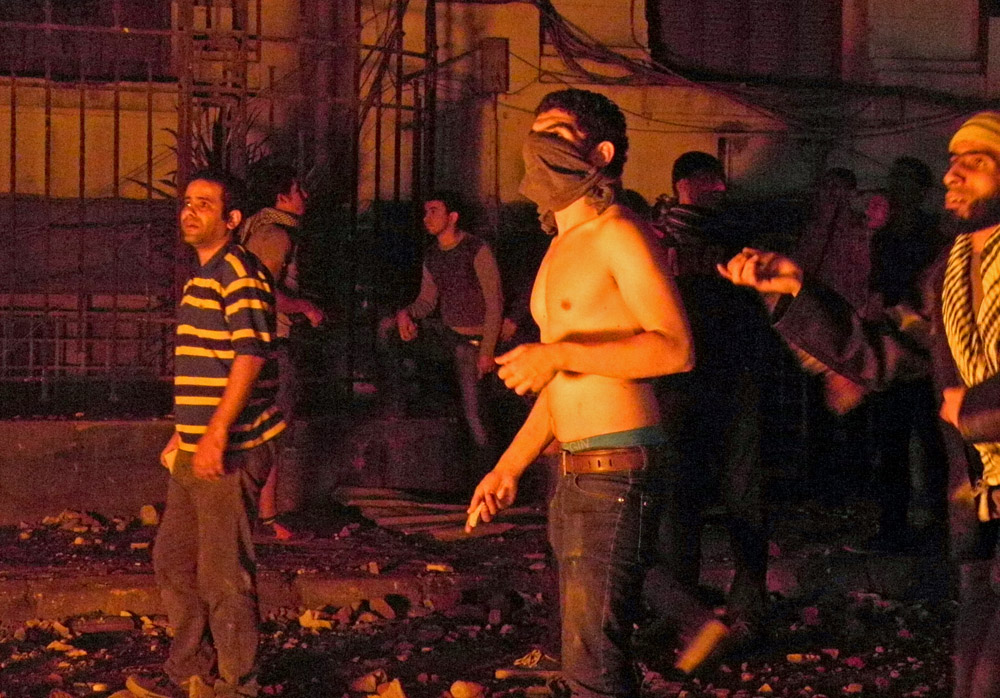CAIRO: Perhaps the right question to ask, is why wouldn’t Egyptians be miserable?
As Egyptians, we are probably genetically predisposed to melodrama; to extremes of all types. We laugh a lot, we cry a lot, we complain a lot and have an almost debilitating sense of indignation in the face of extreme injustice that almost always turns us into tragic heroes. Sadly our strain of heroism is more inclined towards antiheroism, where the poor unfortunate souls who make up the majority of our ever-expanding population of almost 80 million are both aggressors and victims of their own folly.
Take for instance the case of Raafat Moustafa, father of three little girls aged eight and a half, six and a half and five years old, who last April started a visually shocking sit-in on the pavement in front of the parliament building that lasted over a month. Along with his daughters, he covered his head with red balaclava-like bags and put nooses around their necks to protest a school decision that denied one of his daughters enrollment in a primary school on the basis that she is too young, while he claimed two other children her age or even younger were accepted at Al-Gomhuria Primary School in Shubra.
His dramatic outburst against such “nepotism” as he put it, may have been justified on many levels, especially since he had tried again and again to seek a solution to his problem through official, legal means but to no avail.
“It’s easier to meet the angel of death than to meet an Egyptian official,” he told reporters in an interview.
The conclusion was that he ended up being slapped with a complaint at the general attorney’s office initiated by Minister of Family and Population Moshira Khattab who accused him of “endangering his children and of instilling sentiments of hatred and intolerance”.
What he did on the streets of Cairo was indeed a rare display of lack of apathy and, on many levels, a valiant stand against the injustice faced by many “ordinary Egyptians” – the ones with no connections above ground to keep them from falling into the abyss of complete marginalization.
Yet his fate, like that of the few who would dare attempt such a dangerous public display of anger and resentment, was ironically that of the antihero par excellence: as the antithesis of the archetypal hero in a typical tragedy, he is the one who ended up at fault, possibly even facing charges of child abuse ironically for standing up for his childrens’ right to equitable treatment by the official education system. His quixotic attempt to seek justice not only back-fired on him, but perhaps even caused more harm to his children.
Now to go back to the question I posed at the beginning: Why are Egyptians miserable?
The question was inspired by the results of a recent Gallup World Poll measuring wellbeing conducted between 2005 and 2009, which catalogued respondents’ daily feelings to assess the percentage of people “thriving, struggling or suffering.”
According to an article published in this newspaper yesterday, the poll placed Egypt at 115 of 155 countries around the world. The survey also showed that only 10 percent of Egyptians said they were content to face the pressures of life.
Why am I not surprised? With some 20 to 30 percent of Egyptians living below the poverty line, as per UN statistics, and about 13.6 million Egyptians (one in every five) unable to meet their basic needs, it’s hard to imagine why Egyptians would not be miserable. Romantic notions of happiness coming from within and the spiritual loftiness to transcend dire, excruciating circumstances have no place in the lives of those who live from hand to mouth, whose very humanity is challenged every single day.
As the study found, there is a direct correlation between wealth and happiness, but while wealth may not guarantee absolute wellbeing, the complete lack of means will certainly guarantee complete misery.
It’s all relative to individual predispositions, but on the very basic levels, just compare having constant access to water and electricity to not having it; having access to good healthcare and education to the opposite and having the luxury to look forward to getting a decent job through one’s own merit and hard work to not even having the luxury to dream of doing so.
Incidentally, a recent Newsweek ranking also placed Egypt at 74 out of 100 best countries to live in citing low rankings in economic dynamism (61), education (62), quality of life (66), health (74), with the cherry on top being the country’s dire political environment at 83, barely ahead of Qatar, Ethiopia, and Azerbaijan.
Polls may not be the ideal way to measure the most illusive question humans have ever debated – what is happiness – but they surly give you a glimpse of what it means to be miserable.
Sadly, Egypt seems to tick all boxes.
Rania Al Malky is the Chief Editor of Daily News Egypt.

